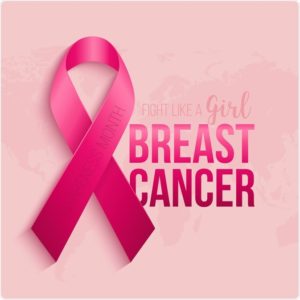Pink October – The fight against breast cancer is on
 Breast cancer has been ranked the first commonest cancer among women in the country according to the 2020 GLOBOCAN Statistics, an online database providing global cancer statistics and incidence of mortality in 185 countries for 36 types of cancer.
Breast cancer has been ranked the first commonest cancer among women in the country according to the 2020 GLOBOCAN Statistics, an online database providing global cancer statistics and incidence of mortality in 185 countries for 36 types of cancer.
Breast cancer forms 31.8 per cent of female cancers and a major contributor to cancer related deaths among women.
Estimates from the World Health Organisation (WHO) put the Age Standardised Incidence Ratio (ASIR) at 66.4/100,000 of the population, though there is no cancer registry in Ghana to substantiate this.
The (WHO) estimates the incidence-mortality ratio of breast cancer in Ghana at 13.0, making mortality from the disease relatively high in the country as well as other developing countries.
It is for this reason that Ghana joins the rest of the world to celebrate one whole month of Breast Cancer Awareness, which began from Friday, October 1 to Sunday, October 31, 2021.
The month, also referred to as Pink October, helps to increase attention and support for awareness, early diagnosis, and treatment as well as palliative care for women suffering from the disease.
It is a yearly campaign to educate people on the importance of early screening and tests.
Though there has been an increase in awareness on breast cancer by various organisations including civil society and non-governmental organisations in the country, most patients in the country report to the hospital late with an advanced stage of the disease, many months after first noticing a change in their breasts.
This has led to periodic clinical breast screening programmes and self-breast examination.
These were previously uncoordinated, but presently there has been greater effort at coordination by the Ghana Health Service.
Breast cancer affects Ghanaians from as young as 20 years but it is generally common as one gets older, with majority of cases being between ages 40 – 49 years.
Dr Florence Dedey, A Consultant and Surgeon of the Breast Unit, Korle-Bu Teaching Hospital, cautioned women to be breast aware and report any changes to a qualified health practitioner to begin treatment.
She urged women to adopt healthy lifestyles to reduce their chances of getting the disease and advised those who already has it to comply with the treatment as prescribed.
Dr Dedey advised women with the disease not to feel shy about reporting to the hospital if they saw changes in their breasts as that would enhance early diagnosis and treatment.
She said research had shown that stigma was one of the major causes of breast cancer deaths and, therefore, urged the public to avoid stigmatising persons suffering the disease to prolong the lifespan of patients.
Doctors and scientists say most cases of Breast Cancer do not have any identifiable cause. However, educating women on the predisposing factors of breast cancer and the need to encourage them to adopt healthy lifestyles is very necessary.
Women who have an increased risk of breast cancer (example strong family history of breast cancer in first degree relatives) are advised to be more cautious and not joke with self-breast examination and clinical examination at least once a month to know the state of their breasts.
These two methods of examinations are very important because it leads to early detection and treatment of the disease.
It is important that women and girls know how to examine their breasts to report any changes as early as possible.
Meanwhile, the 37 Military Hospital, Korle-bu Polyclinic, and Lester Hospital are among health institutions embarking on breast cancer screening throughout the month of October.
By Samiratu Larbie
Source: GNA
